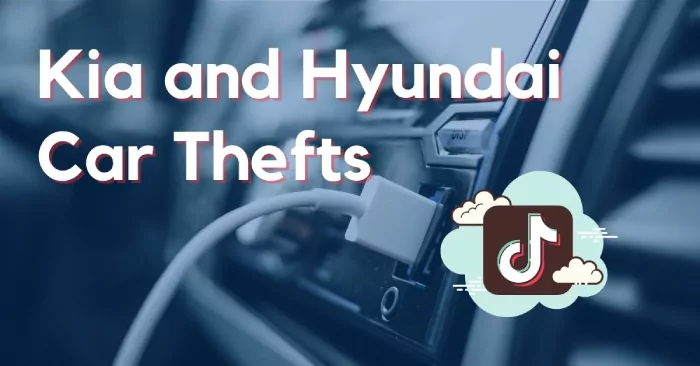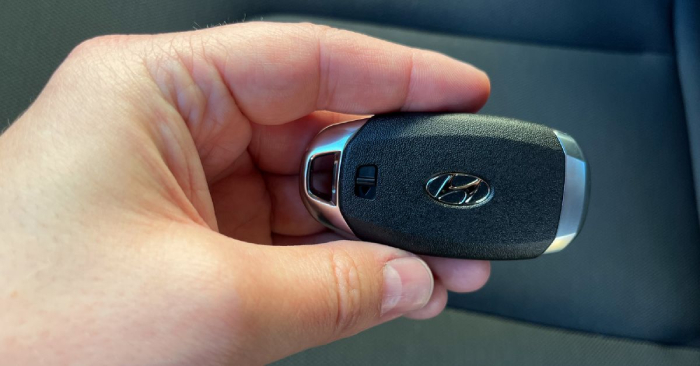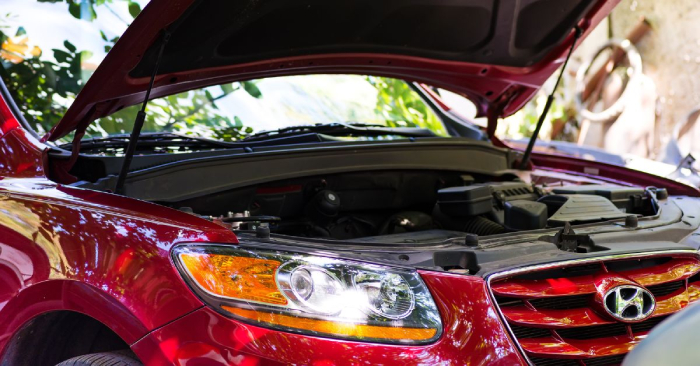If you own a 2012-2021 Kia or 2015-2021 Hyundai, you may have trouble insuring your vehicle thanks to a group of teens known online as the “Kia Boyz” who have identified security loopholes in certain Kia and Hyundai vehicles. Without an engine immobilizer, these cars could be started without a key, leading to a surge in both Hyundai and Kia car thefts across the United States.
The situation became dire after the online trend dubbed the “Kia challenge” went viral on TikTok, with footage of joyriding teens in stolen cars being widely shared.
Last year alone, 67 percent of the 10,471 vehicles stolen in the country were either a Hyundai or a Kia, prompting questions about why these cars are so vulnerable and whether the manufacturers were taking adequate steps to protect consumers from Kia and Hyundai thefts.
The situation has become particularly alarming, as 14 crashes and 8 fatalities have been attributed to the Hyundai and Kia theft problem. If you own one of these vehicles, it is important to be aware of the potential risks and take steps to protect yourself.
Consider installing an engine immobilizer or a steering wheel lock to deter thieves. You may also want to consult with a licensed attorney who can help you understand your legal rights and options, particularly if you have incurred losses or expenses as a result of the Hyundai and Kia security flaw.

Overview of the Hyundai and Kia Car Theft Problem
The surge in car thefts has been attributed to a viral TikTok video called the “Kia Challenge.” The video surfaced in 2021 and resurfaced in July 2022, demonstrating how to easily steal certain models of Kia and Hyundai vehicles using only a USB cord.
Despite being taken down by TikTok, the video has created a serious security issue for Kia and Hyundai vehicles, as their lack of anti-theft technology has made them particularly vulnerable to this type of attack.
Law enforcement officials and state attorneys general have raised concerns about the safety and security of vehicle owners and are urging the companies to take swift action to address the issue.
The situation surrounding the vulnerability of certain vehicle models has become so dire that State Farm and Progressive have stopped insuring several different Kia and Hyundai cars.
Additionally, there have been numerous class-action lawsuits filed across the country aimed at pressuring the manufacturers to issue a recall or fix the cars’ vulnerability. Current lawsuits cover any 2011-2021 Hyundai or Kia vehicle sold in the United States within the past five years.
Why are Hyundais and Kias easy to steal?
Between 2011 and 2022, Hyundai and Kia chose not to include “engine immobilizers” as a standard feature in their cars sold in the U.S. According to the states, this anti-theft device was a standard feature on other new cars during that time.
The lack of this device has made these vehicles an easy target for thieves, leading to an alarming increase in thefts. Affected vehicles can be easily stolen using just a USB cord and a screwdriver.
Which Kia and Hyundai models are being stolen?
Virtually all 2015-2021 Kia & Hyundai vehicles are at risk of the theft issue. Popular models that are frequently being stolen include: 2017-2020 Hyundai Elantra, 2015-2019 Hyundai Sonata, and 2020-2021 Hyundai Venue vehicles. 
Do the manufacturers have a fix for the USB theft issue?
Hyundai and Kia are offering theft deterrent software to millions of their vehicles without an immobilizer. The software is being provided free of charge to vehicle owners and updates the theft alarm software logic. This new logic extends the alarm sound from 30 seconds to one minute and requires the key to be in the ignition switch to turn the vehicle on.
To obtain the free update, the National Highway Traffic Safety Administration (NHTSA) urges owners of these vehicles to contact Hyundai and Kia directly at their toll-free numbers, 800-633-5151 and 800-333-4542 respectively. NHTSA announced that approximately 3.8 million Hyundais and 4.5 million Kias qualify for the free software update.
Hyundai has started rolling out the software update with the first batch of updates for about 1 million model years 2017-2020 Elantra, 2015-2019 Sonata, and 2020-2021 Venue vehicles.
Remaining eligible vehicles are scheduled to receive the software update by June. Hyundai and Kia are also providing their customers with window stickers that notify potential thieves that their vehicles have anti-theft protection.
The companies will roll out software updates in phases over the next few months, beginning later this month. Kia and Hyundai have also provided more than 26,000 steering wheel locks to law enforcement agencies in 12 states since November 2022. Interested vehicle owners are encouraged to contact local law enforcement to check if a wheel lock is available.
Should I join a Hyundai or Kia theft class action lawsuit?
If you are considering joining a Hyundai or Kia theft class action lawsuit, it is important to understand the potential benefits and risks. By joining a class action lawsuit, you may be able to recover damages for losses or expenses you incurred as a result of a Kia or Hyundai car theft, or other related security issues.
However, you should also be aware that the outcome of the lawsuit is uncertain, and there is no guarantee of a favorable outcome. Before joining a class action lawsuit, you may want to consult with a licensed attorney who can evaluate the specifics of your situation and provide you with guidance on your legal options.
An attorney can help you understand the strengths and weaknesses of your case, as well as the potential outcomes and risks associated with pursuing legal action.
Why should I file a lemon law claim instead?
If you’ve purchased a Kia or Hyundai that has been affected by or stolen due to a security vulnerability, filing a lemon law claim may be an alternative option to consider. Lemon laws are state laws that provide legal protection to consumers who have purchased defective vehicles, and the ongoing Kia Hyundai theft problem may be one example of such defects.
If your case qualifies under the California Lemon Law, you may be able to seek compensation or a replacement vehicle if you’ve experienced issues due to the security loophole that affects certain models. One advantage of filing a lemon law claim is that it can be tailored to your specific experience with the car. Unlike class action lawsuits, which may involve many plaintiffs with different circumstances, lemon law claims are focused on your individual situation.
This can be particularly helpful if you have experienced the frustration and financial burden of these security flaws and have not received adequate support from the manufacturer.
Another potential advantage of filing a lemon law claim for a Hyundai or Kia security defect is that it may provide greater potential for compensation. Depending on the specific details of your case, you may be able to seek a full refund of your purchase price or a replacement vehicle if you’ve repaired your vehicle for this defect on previous occasions under warranty.

What should I do next?
If you are facing the Kia and Hyundai theft issue and are considering taking legal action, it is crucial to consult with a lemon law attorney who specializes in consumer protection and auto defect cases.
An experienced attorney can provide valuable guidance and advocacy throughout the entire process, from assessing the validity of your claim, gathering necessary documentation, negotiating with the manufacturer or dealer, and representing you in court if necessary.
Dealing with the Kia and Hyundai theft issue can be challenging and time-consuming, which is why it’s essential to have a knowledgeable attorney who can navigate the intricacies of state and federal lemon law statutes and regulations, ensuring that you receive the maximum compensation possible for any defects with your vehicle.
At the Lemon Law Experts we understand the difficulties you may be facing, and our team is here to help. The Lemon Law Experts hold experience in successfully handling cases related to security defects across California, and we are committed to helping you receive the compensation and justice you deserve.
We understand the stress and frustration that come with dealing with defective vehicles, which is why we provide responsive and attentive representation. Our team will keep you updated throughout the entire process, answer your questions promptly, and ensure that you feel comfortable and confident in our ability to represent you effectively. Contact us today for a free, no-obligation case analysis.




